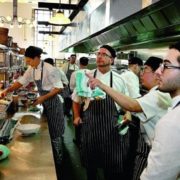CHEF SKILLS SHORTAGE: MILLENNIAL MINDSET OR LACK OF EFFECTIVE LEADERS TO BLAME?
Industry wide, there has been a great deal of heated debate surrounding the cause of the shortage of skilled industry professionals – in particular, qualified chefs.
While some state that ‘Gen Y’ is to blame for the shortfall of more than 38,000 skilled chefs in Australia, others blame the diminishing lack of effective leaders to mentor and inspire our ever-evolving workforce. Regardless of who is to blame for this skills shortage, the increasing demand for chefs, inadequate training and an indifference to the idea of doing the hard yards are definitely key factors behind the issue – but how do we address this problem? Who is it that needs to change?
In a recent article, it was suggested that Gen Y is to blame for the skills shortage of qualified chefs across the industry. The News.com piece titled ‘Apprentice chefs hit back at claims they are to blame for the Australian chef shortage’ raises some valid opinions from various leaders throughout the culinary world. Some agreeing that although Gen Y may be partly to blame, it is ultimately the lack of effective mentors. There just isn’t enough willing to teach and encourage young chefs to pursue cooking as a career.
Zane Heemi – head chef of Bluebonnet Barbecue in Melbourne – is one of the key contributors to the article, raising the point that the older generations of chefs were raised in ‘militant-style’ kitchens, and that those types of working environments just do not work when educating and training today’s cooks.
“They were raised in much tougher kitchens, and before the saturation of food glamourisation on TV. Most of the chefs in the industry really wanted to be there — it wasn’t glamorous and it was unpopular, and there were no rockstars, so the drive was different.” – Zane Heemi
This miscommunication between employees and their managers isn’t just occurring within the chef profession, but is happening across the entire hospitality industry.
In the BENCHHMARQUE article ‘A lack of effective leaders has created the hospitality skills gap’, they argue a similar point. That over and above everything else, the one thing that doesn’t work in today’s restaurants or venues, are management style personalities who rule by fear. Business owners must hire inspiring people, who can lead and support their teams, while investing time in their people.
While the industry does produce experienced and qualified senior chefs, the challenge lies with these leaders to encourage the young and ambitious to stay motivated enough to pursue it as a career.
Renowned chef / owner of Noma (aka world’s best restaurant) Rene Redzepi, wrote an article for David Chang’s ‘Lucky Peach’ food publication on how leaders within the industry are responsible for changing the culture of our kitchens. The days of ruling by fear, yelling and screaming in the kitchen are gone – Rene focuses on the fact that although great restaurants need organisation and control, they will not be successful unless they have confident staff who are motivated to cook better. Being a chef who used to lead by fear, he addresses why he decided to make a change:
“I want things to change for the sake of this profession. When we started trying to change the culture at Noma, we did it for the sake of our own happiness. I didn’t expect that it would also make us a better restaurant. But it did. This has worked for us. I genuinely do see the improvement in the staff’s morale, in our guests’ satisfaction, in the quality of our creativity and execution.” – Rene Redzepi
So if we revisit our original question. Do the current experienced and professional leaders within the industry need to evolve, or is the challenge purely with the largest demographic currently in our workforce?
One thing is for certain, the workforce isn’t going to change and revert to ancient ways in which to be managed. As leaders who have worked their way through the industry and experienced the change first hand, it’s up to us to adopt and educate new methods to inspire our workforce as opposed to dispensing of people without a thought. Let’s try something different, invest in the human resources and try to remember that we were once in their shoes.
There is an abundance of culinary roles open across our city. It’s a candidate driven market and people have great choice in where they decide to work – so in order for our venues to retain quality staff, leaders need to ask themselves how they are addressing the skills shortage, and creating a more motivating and inspiring professional environment to be in.
BENCHMARQUE have produced an e-book ‘Effective Managers: Ways to combat the hospitality skills shortage and enhance business growth’. It provides some valuable insight into what you can do to retain and attract super talent. Click on the button below to download your free copy now.
Article by Marlowe Bennett,Founder/Director, BENCHMARQUE













